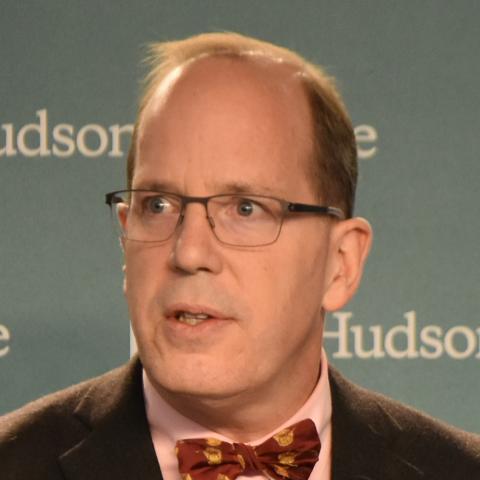Ten years after the grim September morning on which Islamist terrorists smashed hijacked airliners into the World Trade Center towers in Manhattan and into the Pentagon and failed to fly a fourth into the Capitol or the White House Americans have cause to reflect with pride on their government's successful prevention of further attacks.
On this anniversary, of course, the media will surely serve up a smorgasbord of analyses encour- aging reflection upon everything objectionable about the U.S. "war on terrorism." While there remains much to debate, however, it is difficult to get around the fact that the much-feared "9/11" follow-up strikes have not occurred. To be sure, a jihadist U.S. Army major murdered 12 of his fellow soldiers at Ft. Hood, and yes, terrorists continue to exact a toll upon U.S. forces in Afghanistan and Iraq. For the most part, however, the additional homeland attacks we all imagined after September 2001 and which President George W. Bush once described as his greatest nightmare are a story of the dog that did not bark. And the reason it did not bark has to do with how resolutely and effectively the U.S. Government responded in tightening domestic security and "taking the fight to the terrorists" overseas.
I'll grant that we've also been lucky. We were lucky that the "shoe bomber" failed to ignite the plastic explosive in his sneakers, lucky that the "underwear bomber" similarly botched his crotch bomb, and lucky that the "Times Square bomber" bollixed up the timer for his car full of explosives. But the oddball tactics explored by terrorists still aiming to knock U.S. airliners out of the sky highlight the jihadists' desperation, and the fact that so many more "normal" avenues of attack have now been closed. Security is vastly improved, people are vigilant, and the terrorists are being kept off balance by aggressive countermoves that have made it much harder to operate from foreign sanctuaries.
There is a temptation, in conservative circles, to give the Bush Administration all the credit for this. After all, it was the one that made the toughest calls, and it was for its pains excoriated in the international and domestic media for an excess of bloody-minded ruthlessness. Nor can one avoid being struck by the degree to which, after some strident anti-Bush rhetoric and political posturing, the administration of Barack Obama has come to embrace most of the counter-terrorist policies of its predecessor. The prison at Guantánamo Bay remains open, for instance, and terrorists are still subject to potentially permanent detention there or elsewhere; military commissions are still being used to try terrorist suspects; CIA-facilitated "renditions" still sometimes occur; domestic electronic surveillance is today conducted on a considerably broader basis than before 9/11; and security and passenger pre-screening for air transportation is ubiquitous and intrusive. In fact, some controversial Bush-era tactics have been not merely validated by the Obama Administration but today greatly expanded most notably, the policy of carrying out targeted killings of terrorist operatives by drone aircraft or special operations forces, which today occurs with a frequency, and in a number of countries, notably greater than when Bush left office. (As recently illustrated by the case of clerical firebrand Anwar al-Awlaki, even U.S. citizens can be targeted if they throw their lot in with the terrorists.)
But while conservatives can be forgiven for sneering a bit at the way the Obama Administration's moralistic self-righteousness has been succeeded by a quiet, almost embarrassed validation of Bush-era counter-terrorist policy, we need to give credit where credit is due. Bush policies did not adopt themselves; they were chosen, and it cannot have been easy for Obama's team to swallow that pill. As a result, however, it is now possible to point to a bipartisan American approach to counter-terrorism. (In a backhanded way, the current administration has in this respect albeit perhaps in this one only lived up to its self-congratulatory hype as a purveyor of "post-partisan" policy.) We conservatives should not demean this, for it is significant.
To be sure, ten years after 9/11, we are a grimmer polity than we were, and some innocence has surely been lost. America has become a country that routinely hunts down and kills individual terrorist enemies overseas apparently now in preference to capturing and detaining them indefinitely and its citizens put up with more burdensome security restrictions in transportation and in public places than before, as well as with a somewhat less constricted system of domestic electronic surveillance. There is something to mourn in these shifts.
But there is also much of which we should be proud, for although the terrorists were able to slaughter more than 3,000 Americans over the space of a few hours in 2001, their ambitions to inflict more such grievous blows upon the U.S. homeland have been stymied ever since. We may have lost some innocence, moreover, but America still remains a bastion of civil and political freedom and a locus of economic opportunity in a world not precisely overflowing with either of these things. Liberal political hyperbole aside, we have not "become our enemies," and we remain a free people with a vibrant society.
It is a mark of the success of the United States' tough-minded and now, if belatedly, bipartisan approach to counter-terrorism that our most pressing political issues today are the domestic challenges of debt, job creation, unsustainable entitlement spending, and the appropriate size of government. After a decade of having avoided further mass-casualty international terrorist outrages on our soil after 9/11, we are happily in a position in which it is possible to imagine having another such decade ahead, in which we can remain free to grapple with such parochial issues without airliners landing upon our heads.
















